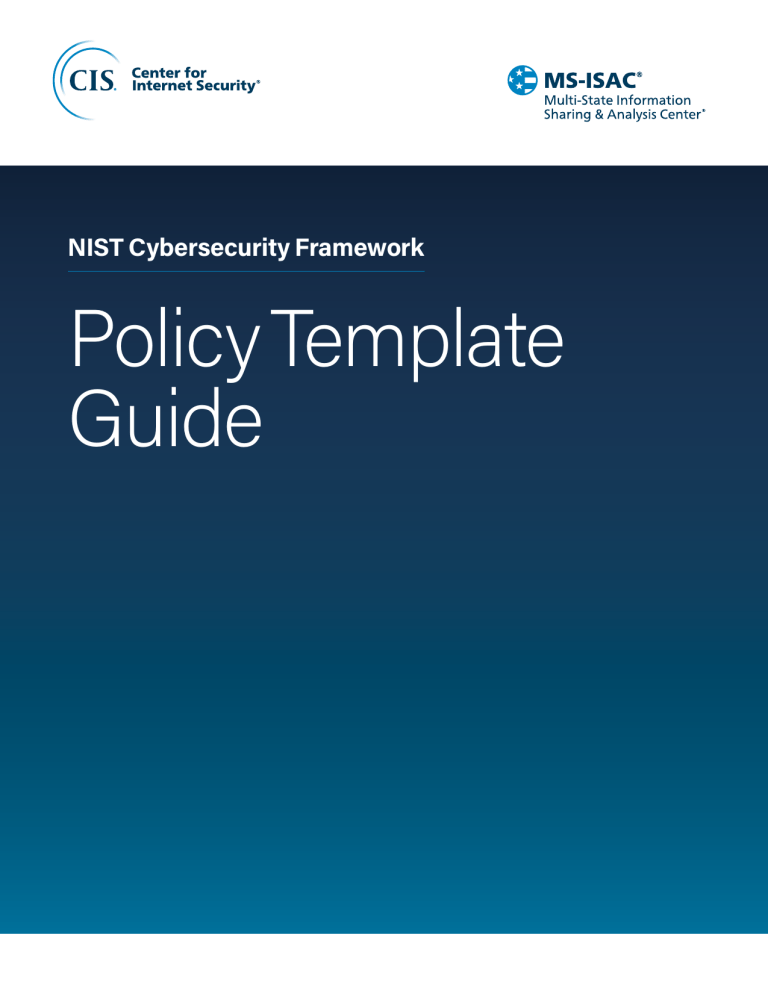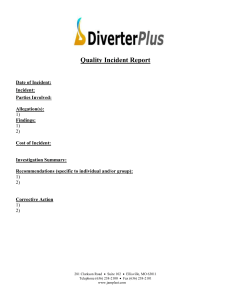NIST-Cybersecurity-Framework-Policy-Template-Guide-v2111Online
advertisement

NIST Cybersecurity Framework Policy Template Guide cisecurity.org/ms-isac/ Page 1 Contents cisecurity.org/ms-isac/ Introduction 1 NIST Function: Identify 2 Identify: Asset Management (ID.AM) Identify: Risk Management Strategy (ID.RM) Identify: Supply Chain Risk Management (ID.SC) 2 2 2 NIST Function: Protect 4 Protect: Identity Management and Access Control (PR.AC) Protect: Awareness and Training (PR.AT) Protect: Data Security (PR.DS) Protect: Information Protection Processes and Procedures (PR.IP) Protect: Maintenance (PR.MA) Protect: Protective Technology (PR.PT) 4 4 4 5 6 6 NIST Function: Detect 7 Detect: Anomalies and Events (DE.AE) Detect: Security Continuous Monitoring (DE.CM) Detect: Detection Processes (DE.DP) 7 7 7 NIST Function: Respond 8 Respond: Response Planning (RS.RP) Respond: Communications (RS.CO) Respond: Analysis (RS.AN) Respond: Improvements (RS.IM) 8 8 9 9 NIST Function: Recover 10 Recover: Recovery Planning (RC.RP) Recover: Improvements (RC.IM) Recover: Communications (RC.CO) 10 10 10 Contents Page i Introduction The Multi-State Information Sharing & Analysis Center (MS-ISAC) is offering this guide to participants of the Nationwide Cybersecurity Review (NCSR) and MSISAC members, as a resource to assist with the application and advancement of cybersecurity policies. The policy templates are provided courtesy of the State of New York and the State of California. The templates can be customized and used as an outline of an organizational policy, with additional details to be added by the end user. The NCSR question set represents the National Institute of Standards and Technology Cybersecurity Framework (NIST CSF). This guide gives the correlation between 49 of the NIST CSF subcategories, and applicable policy and standard templates. A NIST subcategory is represented by text, such as “ID.AM-5.” This represents the NIST function of Identify and the category of Asset Management. For additional information on services provided by the Multi-State Information Sharing & Analysis Center (MS-ISAC), please refer to the following page: https:// www.cisecurity.org/ms-isac/services/. These policy templates are also mapped to the resources MS-ISAC and CIS provide, open source resources, and free FedVTE training: https://www.cisecurity.org/wp-content/uploads/2019/11/CybersecurityResources-Guide.pdf. Disclaimer: These policies may not reference the most recent applicable NIST revision, however may be used as a baseline template for end users. These policy templates are not to be used for profit or monetary gain by any organization. cisecurity.org/ms-isac/ Introduction Page 1 NIST FUNCTION: Identify Identify: Asset Management (ID.AM) ID.AM-1 Physical devices and systems within the organization are inventoried. Acceptable Use of Information Technology Resource Policy Access Control Policy Account Management/Access Control Standard Identification and Authentication Policy Information Security Policy Security Assessment and Authorization Policy Security Awareness and Training Policy ID.AM-2 Software platforms and applications within the organization are inventoried. Acceptable Use of Information Technology Resource Policy Access Control Policy Account Management/Access Control Standard Identification and Authentication Policy Information Security Policy Security Assessment and Authorization Policy Security Awareness and Training Policy ID.AM-4 External information systems are catalogued. System and Communications Protection Policy ID.AM-5 Resources (e.g., hardware, devices, data, time, and software) are prioritized based on their classification, criticality, and business value). Information Classification Standard Information Security Policy ID.AM-6 Cybersecurity roles and responsibilities for the entire workforces and third-party stakeholders (e.g. suppliers, customers, partners) are established. Acceptable Use of Information Technology Resource Policy Information Security Policy Security Awareness and Training Policy Identify: Risk Management Strategy (ID.RM) ID.RM-1 Risk management processes are established, managed, and agreed to by organizational stakeholders. Information Security Policy Information Security Risk Management Standard Risk Assessment Policy Identify: Supply Chain Risk Management (ID.SC) ID.SC-2 cisecurity.org/ms-isac/ Suppliers and third-party partners of information systems, components, and services are identified, prioritized, and assessed using a cyber supply chain risk assessment process. Identification and Authentication Policy Security Assessment and Authorization Policy Systems and Services Acquisition Policy NIST Function: Identify Page 2 cisecurity.org/ms-isac/ ID.SC-4 Suppliers and third-party partners are routinely assessed using audits, test results, or other forms of evaluations to confirm they are meeting their contractual obligations. Identification and Authentication Policy Security Assessment and Authorization Policy Systems and Services Acquisition Policy ID.SC-5 Response and recovery planning and testing are conducted with suppliers and third-party providers. Computer Security Threat Response Policy Cyber Incident Response Standard Incident Response Policy Systems and Services Acquisition Policy NIST Function: Identify Page 3 NIST FUNCTION: Protect Protect: Identity Management and Access Control (PR.AC) PR.AC-1 Identities and credentials are issued, managed, verified, revoked, and audited for authorized devices, users and processes. Access Control Policy Account Management/Access Control Standard Authentication Tokens Standard Configuration Management Policy Identification and Authentication Policy Sanitization Secure Disposal Standard Secure Configuration Standard Secure System Development Life Cycle Standard PR.AC-3 Remote access is managed. Remote Access Standard PR.AC-4 Access permissions and authorizations are managed, incorporating the principles of least privilege and separation of duties. Access Control Policy Account Management/Access Control Standard Authentication Tokens Standard Configuration Management Policy Identification and Authentication Policy Sanitization Secure Disposal Standard Secure Configuration Standard Secure System Development Life Cycle Standard PR.AC-5 Network integrity is protected (e.g., network segregation, network segmentation). 802.11 Wireless Network Security Standard Mobile Device Security System and Information Integrity Policy Protect: Awareness and Training (PR.AT) PR.AT-1 All users are informed and trained. Acceptable Use of Information Technology Resources Policy Information Security Policy Personnel Security Policy Physical and Environmental Protection Policy Security Awareness and Training Policy Protect: Data Security (PR.DS) PR.DS-1 cisecurity.org/ms-isac/ Data-at-rest is protected Computer Security Threat Response Policy Cyber Incident Response Standard Encryption Standard Incident Response Policy Information Security Policy Maintenance Policy Media Protection Policy Mobile Device Security Patch Management Standard NIST Function: Protect Page 4 PR.DS-2 Data-in-transit is protected. Computer Security Threat Response Policy Cyber Incident Response Standard Encryption Standard Incident Response Policy Information Security Policy Maintenance Policy Media Protection Policy Mobile Device Security Patch Management Standard PR.DS-3 Assets are formally managed throughout removal, transfers, and disposition. Access Control Policy Account Management/Access Control Standard Authentication Tokens Standard Configuration Management Policy Identification and Authentication Policy Sanitization Secure Disposal Standard Secure Configuration Standard Secure System Development Life Cycle Standard PR.DS-8 Integrity checking mechanisms are used to verify hardware integrity. System and Information Integrity Policy Protect: Information Protection Processes and Procedures (PR.IP) cisecurity.org/ms-isac/ PR.IP-1 A baseline configuration of information technology/industrial control systems is created and maintained incorporating security principles (e.g. concept of least functionality). Access Control Policy Account Management/Access Control Standard Authentication Tokens Standard Configuration Management Policy Identification and Authentication Policy Sanitization Secure Disposal Standard Secure Configuration Standard Secure System Development Life Cycle Standard PR.IP-4 Backups of information are conducted, maintained, and tested. Computer Security Threat Response Policy Cyber Incident Response Standard Encryption Standard Incident Response Policy Information Security Policy Maintenance Policy Media Protection Policy Mobile Device Security Patch Management Standard PR.IP-6 Data is destroyed according to policy. Maintenance Policy Media Protection Policy Sanitization Secure Disposal Standard NIST Function: Protect Page 5 PR.IP-9 PR.IP-10 Response plans (Incident Response and Business Continuity) and recovery plans (Incident Recovery and Disaster Recovery) are in place and managed. Computer Security Threat Response Policy Cyber Incident Response Standard Incident Response Policy Planning Policy Response and recovery plans are tested. Computer Security Threat Response Policy Cyber Incident Response Standard Incident Response Policy Planning Policy Protect: Maintenance (PR.MA) PR.MA-2 Remote maintenance of organizational assets is approved, logged, and performed in a manner that prevents unauthorized access. Maintenance Policy Remote Access Standard Security Logging Standard Protect: Protective Technology (PR.PT) cisecurity.org/ms-isac/ PR.PT-1 Audit/log records are determined, documented, implemented, and reviewed in accordance with policy. Access Control Policy Account Management/Access Control Standard Authentication Tokens Standard Configuration Management Policy Identification and Authentication Policy Sanitization Secure Disposal Standard Secure Configuration Standard Secure System Development Life Cycle Standard Security Logging Standard PR.PT-2 Removable media is protected and its use restricted according to policy. Acceptable Use of Technology Resources Policy Media Protection Policy Mobile Device Security PR.PT-4 Communications and control networks are protected. Encryption Standard Information Security Policy Maintenance Policy Media Protection Policy Mobile Device Security System and Communications Protection Policy NIST Function: Protect Page 6 NIST FUNCTION: Detect Detect: Anomalies and Events (DE.AE) DE.AE-3 Event data are collected and correlated from multiple sources and sensors. Auditing and Accountability Standard Security Logging Standard System and Information Integrity Policy Vulnerability Scanning Standard Detect: Security Continuous Monitoring (DE.CM) DE.CM-1 The network is monitored to detect potential cybersecurity events. Encryption Standard Information Security Policy Maintenance Policy Media Protection Policy Mobile Device Security Patch Management Standard Security Assessment and Authorization Policy Vulnerability Scanning Standard DE.CM-4 Malicious code is detected. Auditing and Accountability Standard Secure Coding Standard Security Logging Standard System and Information Integrity Policy Vulnerability Scanning Standard DE.CM-7 Monitoring for unauthorized personnel, connections, devices, and software is performed. Auditing and Accountability Standard Security Logging Standard System and Information Integrity Policy Vulnerability Scanning Standard Detect: Detection Processes (DE.DP) cisecurity.org/ms-isac/ DE.DP-1 Roles and responsibilities for detection are well defined to ensure accountability. Computer Security Threat Response Policy Cyber Incident Response Standard Incident Response Policy Information Security Policy DE.DP-4 Event detection information is communicated. Computer Security Threat Response Policy Cyber Incident Response Standard Incident Response Policy Information Security Policy NIST Function: Detect Page 7 NIST FUNCTION: Respond Respond: Response Planning (RS.RP) RS.RP-1 Response plan is executed during or after an event. Computer Security Threat Response Policy Cyber Incident Response Standard Incident Response Policy Planning Policy Respond: Communications (RS.CO) cisecurity.org/ms-isac/ RS.CO-1 Personnel know their roles and order of operations when a response is needed. Computer Security Threat Response Policy Cyber Incident Response Standard Incident Response Policy RS.CO-2 Incidents are reported consistent with established criteria. Computer Security Threat Response Policy Cyber Incident Response Standard Incident Response Policy RS.CO-3 Information is shared consistent with response plans. Computer Security Threat Response Policy Cyber Incident Response Standard Incident Response Policy NIST Function: Respond Page 8 RS.CO-4 Coordination with stakeholders occurs consistent with response plans Computer Security Threat Response Policy Cyber Incident Response Standard Incident Response Policy RS.CO-5 Voluntary information sharing occurs with external stakeholders to achieve broader cybersecurity situational awareness. Computer Security Threat Response Policy Cyber Incident Response Standard Incident Response Policy Respond: Analysis (RS.AN) RS.AN-4 Incidents are categorized consistent with response plans. Computer Security Threat Response Policy Cyber Incident Response Standard Incident Response Policy Respond: Improvements (RS.IM) cisecurity.org/ms-isac/ RS.IM-1 Response plans incorporate lessons learned. Computer Security Threat Response Policy Cyber Incident Response Standard Incident Response Policy RS.IM-2 Response strategies are updated. Computer Security Threat Response Policy Cyber Incident Response Standard Incident Response Policy NIST Function: Respond Page 9 NIST FUNCTION: Recover Recover: Recovery Planning (RC.RP) RC.RP-1 Recovery plan is executed during or after a cybersecurity incident. Computer Security Threat Response Policy Contingency Planning Policy Cyber Incident Response Standard Incident Response Policy Recover: Improvements (RC.IM) RC.IM-1 Recovery plans incorporate lessons learned. Computer Security Threat Response Policy Contingency Planning Policy Cyber Incident Response Standard Incident Response Policy RC.IM-2 Recovery strategies are updated. Computer Security Threat Response Policy Contingency Planning Policy Cyber Incident Response Standard Incident Response Policy Recover: Communications (RC.CO) RC.CO-1 Public relations are managed. Computer Security Threat Response Policy Cyber Incident Response Standard Incident Response Policy RC.CO-2 Reputation is repaired after an incident. Computer Security Threat Response Policy Cyber Incident Response Standard Incident Response Policy RC.CO-3 Recovery activities are communicated to internal and external stakeholders as well as executive and management teams. Computer Security Threat Response Policy Cyber Incident Response Standard Incident Response Policy cisecurity.org/ms-isac/ NIST Function: Recover Page 10 The Center for Internet Security, Inc. (CIS®) makes the connected world a safer place for people, businesses, and governments through our core competencies of collaboration and innovation. We are a community-driven nonprofit, responsible for the CIS Critical Security Controls® and CIS Benchmarks™, globally recognized best practices for securing IT systems and data. We lead a global community of IT professionals to continuously evolve these standards and provide products and services to proactively safeguard against emerging threats. Our CIS Hardened Images® provide secure, on-demand, scalable computing environments in the cloud. CIS is home to the Multi-State Information Sharing and Analysis Center® (MS-ISAC®), the trusted resource for cyber threat prevention, protection, response, and recovery for U.S. State, Local, Tribal, and Territorial government entities, and the Elections Infrastructure Information Sharing and Analysis Center® (EI-ISAC®), which supports the rapidly changing cybersecurity needs of U.S. election offices. To learn more, visit CISecurity.org or follow us on Twitter: @CISecurity. cisecurity.org info@cisecurity.org 518-266-3460 Center for Internet Security @CISecurity TheCISecurity cisecurity cisecurity.org/ms-isac/ NIST Function: Recover Page 11

